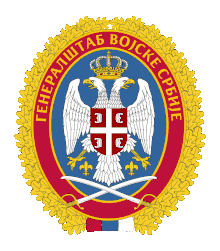Joint Operations Command (Serbia)
Joint Operations Command (JOC) (Serbian: Združena operativna komanda / Здружена оперативна команда) is organizational unit of the Serbian Armed Forces directly subordinated to the General Staff of the Armed Forces. The main duty of the Command is to conduct operational command over Armed Forces. Operations Command has a flexible formation, which is expanded by the representatives of other organizational units of the General Staff, and, if there is a need, operational level commands. In peacetime, the commander of the Joint Operations Command is at the same time Deputy of Serbian Armed Forces General Staff. Although Joint Operations Command’s main function is a command function, Command also performs tasks from planning, organizational, control and operational function.
| Joint Operations Command JOC | |
|---|---|
| Здружена оперативна команда Združena operativna komanda | |
 | |
| Active | January 2007–present |
| Country | |
| Allegiance | |
| Type | Operational command |
| Part of | General Staff |
| Garrison/HQ | Belgrade |
| Commanders | |
| Joint Operations Commander | Maj. Gen. Petar Cvetković |
| Joint Operations Command Deputy | Colonel Željko Tramošljika |
The duties of the Joint Operational Command (JOC) are,
- to plan Crisis Response Operations,
- to command over forces engaged in the operations in the country,
- to plans the use of forces,
- to monitor the engagement and has the command over Serbian Armed Forces in multinational operations.
Organizational structure
The units directly subordinated to the Joint Operations Command are,
- Peacekeeping Operations Center (PKOC),
- Operational Center of the Defence System (OC DS) and
- Military Technical Agreement Implementation Commission (MTA IC).
Peacekeeping Operations Center
The Peacekeeping Operations Center (PKOC) is a unit directly subordinated to the Joint Operations Command of the Serbian Armed Forces General Staff intended for the training, selection, equipping, preparation and deployment of individuals and units from the Ministry of Defence and the Serbian Armed Forces to multinational operations outside the borders of the Republic of Serbia.[1]
The Center is a full member of the European Association of Peace Operations Training Centers and the International Association of Peacekeeping Operations Training Centers. The Peacekeeping Operations Center, as the legal successor of the National Center for Peacekeeping Missions, was established on January 1, 2005, and since it is directly subordinated to the Joint Operations Command of the General Staff. The Operations Center comprises from five departments,
- Human Resources Department,
- Department for Operations and Staff Affairs,
- Training Department,
- Support Department and
- Finance Group.
Defence System Operational Center
The Operational Center of the Defence System (OC DS) is a subordinate unit of the Joint Operations Command with the purpose to monitor activities within Ministry of Defence and Serbian Armed Forces and force engagement in operations. In accordance with the organizational and structural changes, the Operational Center of the Defence System was subordinated to the Joint Operations Command in March 2007. Before that, the Operational Center of the Defence System was within the Directorate of Operations (Ј-3) of the Serbian Armed Forces General Staff. The Operational Center comprises 3 organizational units,
- Data Monitoring, Recording and Processing Department,
- Administration Department and
- Section for Traffic and Transit of Foreign Armed Forces.
The main duties of the Operational Center are organization of operational duty, data base management, management of operational and functional capability data, regulation of waterways and air space traffic as well as recording and providing statistical analysis of emergency situations.
Military Technical Agreement Implementation Commission
Military Technical Agreement Implementation Commission (MTA IC) controls the implementation of MTA regulations, cooperates with KFOR and maintains continuous communication between the Republic of Serbia security forces and KFOR. Based on the Agreement Article 4, Joint Commission for the implementation of the MTA (JIC) was established, composed of KFOR representatives and Serbian Armed Forces and Serbian Ministry of Internal Affairs representatives. By signing the Military Technical Agreement between then Yugoslav Armed Forces and NATO, and adopting the UNSC Resolution 1244, on 10 June 1999, NATO forces air attacks against the FR Yugoslavia were discontinued. NATO was authorized to establish multinational forces for conducting peace operation in Kosovo and Metohija. These multinational units became international security forces – KFOR (Kosovo Force), with headquarters in Priština.
References
- "Joint Operational Command (JOC)". Vojska Srbije (in Serbian).
- "White Book of Defence" (PDF). Ministarstvo odbrane (in Serbian).
- "Defence Act". Narodna Skupština (in Serbian).
- "Serbian Armed Forces Act". Narodna Skupština (in Serbian).
- "Regulation on guidelines of internal structure and systematization of formative positions". Vlada Srbije (in Serbian).